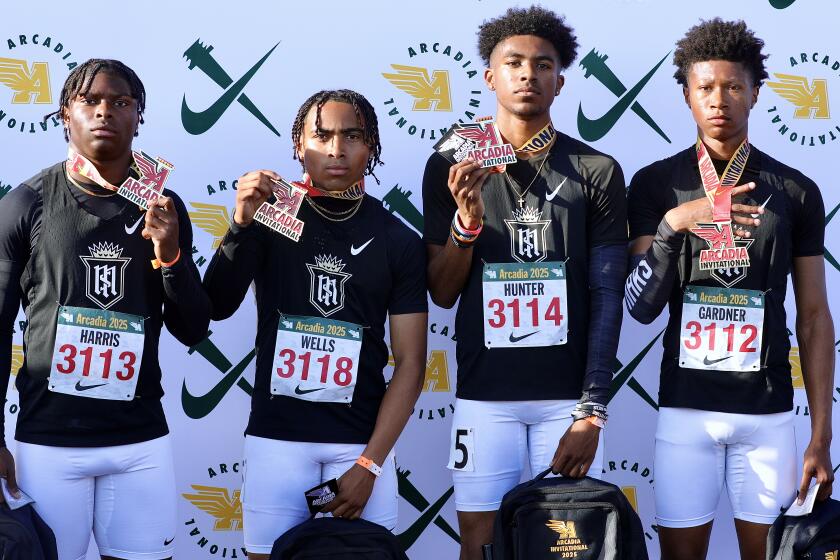Coliseum Violence: Easy Issue
- Share via
On many Mondays, we publish the tally of the weekend’s dead and wounded, victims of drive-by shootings and other episodes of gang violence.
The story usually appears on the metro page and after it’s printed, the events fade away into the mist with the rest of the old news. Seldom do political leaders comment on the deaths, or offer plans to stop the killing.
But as the result of a single weekend beating of a spectator at a Raiders football game--causing a serious but not fatal injury--Los Angeles politicians are churning out a barrage of proposals, warnings, promises and general commentary addressed to the burning issue of fan violence.
City Atty. James K. Hahn decried the attack, as did Mayor Tom Bradley. Los Angeles City Councilman Zev Yaroslavsky called for a ban on beer sales at the Los Angeles Memorial Coliseum, where the beating occurred Sept. 23. So did County Supervisor Mike Antonovich. He said it would create more of “a family atmosphere” at Raiders games.
While I’m sorry that Steelers fan Paul Albrecht was injured and I’m glad he’s getting better, I think the politicians’ display of outrage is, itself, somewhat outrageous. It speaks volumes about those who would solve this region’s myriad problems, if only they knew how.
The politicians knew what they were getting when they begged Al Davis to keep the Silver and Black in town. Trouble. This man has encouraged an outlaw image for his team and fans ever since they were in Oakland, when we had to pick our way through violent drunks in the Oakland-Alameda County Coliseum parking lot.
Commitment to Excellence is the team motto, but in the public’s mind Commitment to Violence is more accurate. The Raiders always have viewed themselves as an outcast brigade, and their followers in the stands strive mightily to emulate.
The single most violent Raiders event in my memory occurred at a championship game with the Seattle Seahawks several years ago. Many of the fans at the west end of the Coliseum, where I was sitting that day, ran onto the field afterward, determined to celebrate the Raiders’ victory by tearing down the goal posts. Huge Coliseum security men were sent sprawling to the turf. The goal posts swayed. Los Angeles police charged. They were beaten back. The goal posts went down. Finally, the mounted police arrived, pounding across the grass like the cavalry, and broke up the mob.
The beer served at the game is only a small part of the problem. The drinking begins long before, at barbecues and picnics on the USC campus or in parking lots. As I threaded my way through the picnics on the USC campus on my way to the Raiders-Bears game last Sunday, it was apparent to me that a substantial number of the Silver-and-Black fans were already loaded.
Anyone who knows the Raiders understands this will never change. Even when the Coliseum is remodeled, reduced in size and the ticket prices are increased, true Raiders fans will find a way inside the stadium. And, unfortunately, nothing will keep the drunks away from booze.
This isn’t a pleasant situation. But in a catalogue of our civic ills, it only rates a footnote. Most people get along perfectly well without football. Most have other, more pressing, concerns.
So why the intense interest by L.A.’s political leaders? Don’t they have more to worry about?
Elected officials are drawn to such incidents. The events are in the headlines and they seem to invite simplistic solutions. It’s a good way of getting on the television and radio news and in the papers. Merely by talking, politicians give an impression of action, even if they’re really not doing much.
And the best part is that nobody gets mad.
Who’s going to stick up for a drunk? Think about Yaroslavsky, who first proposed the beer ban. Every day, he supposedly wrestles with problems that seem all but insoluble. Crime. Waste disposal. Traffic. Air pollution. In one way or another, they’re all on the council agenda. Same is true with Antonovich and his business at the Board of Supervisors.
And so I can understand the interest of Los Angeles politicians in the less challenging problems of the Coliseum: Bullied into submission by the enormous issues confronting the metropolis, they have decided to pick on something more their size--the troublesome but hardly earth-shaking problem of boozy fans brawling at a sports event.
There’s a big lesson in this about the way L.A. is governed. Think about it every time TV news shows you politicians at a disaster scene or commenting on another event or movement they can’t really control.
You call it grandstanding. But it’s really more like football--a diversion from difficult reality.
More to Read
Go beyond the scoreboard
Get the latest on L.A.'s teams in the daily Sports Report newsletter.
You may occasionally receive promotional content from the Los Angeles Times.










